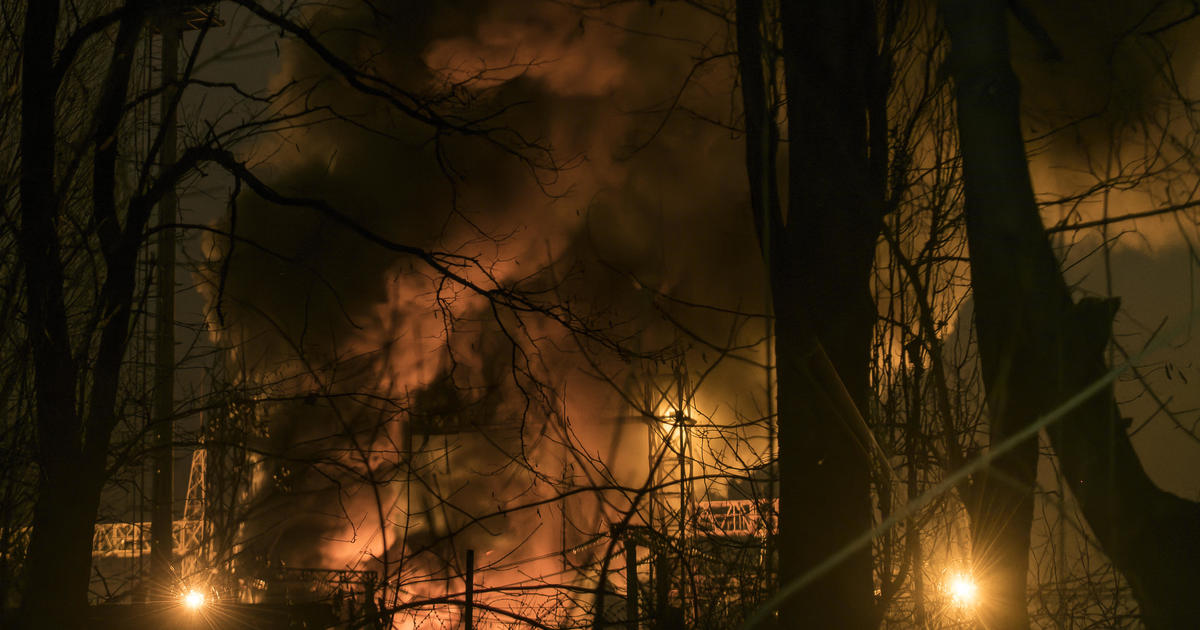Multiple explosive drones attacked Ukraine‘s capital before dawn Monday, local authorities reported, as Russian President Vladimir Putin prepared to visit ally Belarus, which provided the Kremlin’s forces with a launch pad for its invasion of Ukraine almost 10 months ago.
The drone attack came three days after what Ukrainian officials described as one of Russia’s biggest assaults on Kyiv since the war started and as Moscow presses on with its effort to torment Ukraine from the air amid a broad battlefield stalemate.
Russia launched 23 self-exploding drones over Kyiv while the city slept, but Ukrainian forces shot down 18 of them, the Kyiv city administration said on Telegram. No major casualties were reported.
Ukraine’s atomic agency, Energoatom, said that one drone had flown over a part of the South Ukraine Nuclear Power Plant.
“This is an absolutely unacceptable violation of nuclear and radiation safety,” Energoatom said in a statement on social media. “We call once again to prevent nuclear facilities from being exposed to the risk of attack by the Russian army and posing a threat to the nuclear and radiation safety of Ukraine and the world.”
Monday was St. Nicholas Day, an occasion that marks the start of the Christmas holidays in Ukraine and is when children typically receive their first gifts hidden under pillows.
“This is how Russians congratulated our children on the holiday,” Serhii Kruk, the head of Ukraine’s State Emergency Service, wrote on Telegram, attaching photos of firefighters barely distinguished amid the flames of an infrastructure facility that got hit.
“In the night when everyone is waiting for a miracle, the terrorist country continues to terrorize the peaceful Ukrainian people,” Ukraine’s human rights chief, Dmytro Lubinets, said.
Bits of wreckage from the downed drones damaged a road in the central Solomianskyi district and broke windows in a multi-story building in the Shevchenkyvskyi district of Kyiv, city officials said.
One drone struck the home of Olha and Ivan Kobzarenko, ages 84 and 83, in the outskirts of the capital. Ivan sustained a head injury.
Their garage was completely destroyed and their dog, Malysh, was killed. Olha, speaking in her bedroom where shattered glass and blood covered the floor, said the blast flung the front gate into the couple’s house.
“I know that I am not alone,” Olha said. “Everyone is suffering. Everyone.”
Nina Sobol, a 59-year-old clerk working at one of the city’s power companies, was on her way to work when the strikes happened. Like many of her colleagues, she waited outside while emergency services inspected damage.
“I feel really anxious,” she said. “Anxious because you never know at which moment there will be an incoming missile.”
Authorities said a critical infrastructure point was also hit, without giving more details.
Although the capital appeared to be the main target of the latest Russian attack, the armed forces said other places in the country were also targeted.
Kyiv region Gov. Oleksii Kuleba said on Telegram that some infrastructure facilities were damaged across the Kyiv region, as well as private houses, and at least two people were injured.
Ukraine’s air force said on Telegram that its personnel were able to destroy 30 of at least 35 self-exploding drones that Russia launched across the country from the eastern side of the Azov Sea on Ukraine’s southeast coast. Russia is on the other side of the sea.
The Ukrainian military has reported increasing success in shooting down incoming Russian missiles and explosive drones.
Moscow has targeted Ukraine’s energy infrastructure, including in Kyiv, since October as part of a strategy to try to leave the country without heat and light during the bitterly cold winter. It has kept up that effort despite Western sanctions and the supply of Western air defense systems to Ukrainian forces.
On Friday, Ukraine’s capital was attacked as part of a massive strike from Russia. Dozens of missiles were launched across the country, triggering widespread power outages.
Putin was set to travel Monday to Belarus for talks with its authoritarian leader, Alexander Lukashenko, who allowed Russian forces to use Belarusian territory for invading Ukraine and has close defense links with Moscow.
It was to be a rare trip to Minsk by Putin, who usually receives Lukashenko at the Kremlin. Belarus is believed to have Soviet-era weapons stockpiles that could be useful for Moscow, while Lukashenko needs help with his country’s ailing economy.
Analysts say the Kremlin might look again for some kind of Belarusian military support for its Ukraine operations. But the winter weather and Russia’s depleted resources mean any attack probably won’t come soon, according to the Institute for the Study of War, a think tank in Washington.
“The capacity of the Russian military, even reinforced by elements of the Belarusian armed forces, to prepare and conduct effective large-scale mechanized offensive operations in the next few months remains questionable,” the think tank said in an assessment published Sunday.
It also concluded that “it is unlikely that Lukashenko will commit the Belarusian military (which would also have to be re-equipped) to the invasion of Ukraine.”



